It is with the utmost shock and sadness that we heard the news on Sunday 6 December that Pumlani Sibula had passed away. He had been recovering from Covid-19 at home.
Pumlani was a valued colleague at the Stellenbosch University Language Centre for many years. He joined the Language Centre in 2003 as the head of the Unit for isiXhosa, where he was tasked with developing isiXhosa terminology for various departments at the University, as well as teaching isiXhosa language and culture to staff and international students.
Pumlani was well known for his passion for isiXhosa language and culture, and for his inspirational teaching. His most notable teaching achievements include teaching isiXhosa Language and Culture for Global Leadership Adventures (GLA) (a winter school programme for high school students all over the world) from 2007 onwards, as well as teaching isiXhosa Language and Culture at Northwestern University in Chicago, USA, in 2009. He received the Rector’s Award in 2009 and 2011. He left SU for a brief period, and rejoined the isiXhosa portfolio in October 2019.
Pumlani’s legacy lives on also in the subject-specific terminologies he developed for isiXhosa in Sociology, Social Work, Psychology, Law, Economic and Management Sciences, Theology and Engineering. He was also responsible for developing the terminology lists for Soccer, Cricket and Rugby.
On behalf of all of the staff at the Language Centre, I would like to express my sincere condolences to his colleagues, family and friends, and ask that we treasure our memories of Pumlani’s sense of humour, his humility, his love for good food and his passion for language.
We received so many messages and memories from Pumlani’s colleagues that we decided to honour him by creating a wall of remembrance for him on our website. Please take your time to read through the contributions below and remember him. A Language Centre colleague, Faika Haroun, has extracted some video material of Pumlani sharing the gift of isiXhosa in a short video tribute to him. It is available here.
An online memorial service organised by Pumlani’s friends was held on Friday 11 December from 15:00 to 18:00. In addition, the Language Centre commemorated Pumlani online on 1 March, from 14:00 to 15:30 together with his friends, SU colleagues and external collaborators.
May we all find comfort in knowing that he is now at peace. Hamba kakuhle, Pumlani.
– Dr Kim Wallmach, Director, Language Centre

In praise of Pumlani
A creator, a guardian and custodian of words
Phrases, sayings, stories, wisdoms now heard
Passion and pride, honest and true,
stylish and gentle, kind, precious you
Hummings and rhythms, harmonies and rhymes
your songs, your voice, your presence for a time
Our journeys, our crossed paths, an unsighted bend
dearest colleague, comrade, family, friend
– Erica George, Language Centre colleague
A few words about Pumlani
I will remember Pumlani as a dear colleague, for a few reasons in particular.
All those of us who tried to improve our isiXhosa skills by doing the course for staff members will remember Pumlani for his enthusiasm in front of the white board. As soon as one asked a question, he started writing in all colours consecutively on the board, filling up all the blank spaces. It was such a joy for language learners because most of us had been taught by non-mother tongue speakers before.
Always when I wanted to make sure that my isiXhosa greeting or saying or prayer was correct, I could simply drop Pumlani a line. He so enjoyed our mediocre efforts at his language. He was also so positive and encouraging when we tried a few spoken words. His explanations about the Xhosa culture were authentic and wise.
Bra Pumlani will be sorely missed.
Hamba kakuhle, Pumlani.
– Ydalene Coetsee, Language Centre colleague
 Friend and supporter
Friend and supporter
It is with shock and great sadness I learnt about the passing of Pumlani.
Pumlani was a friend and supporter, especially to the Writing Lab – so many years we have known him. He really lived the life of ubuntu – caring for his fellow human beings – an honest, trustworthy, humble, and friendly person with a beautiful heart.
Oh, Pumlani – you were still so young and there were so many things you still needed to do – showing and teaching all of us the ubuntu-spirit and how to care for one another.
May your example live forever in our hearts and your soul rest in peace.
– Anne-Mari Lackay, Language Centre colleague
He would have had the right words
Pumlani was a friend and a brother for more than 17 years. He was one of the kindest and most decent people I have ever met. He stood up for me when no one else would. He comforted me when I was afraid. He even offered to help me when I had money problems. We shared a lot including difficult family backgrounds and feeling isolated. We also both experienced being “corrected lefthanders”. We were made to be right-handed growing up. He never judged me.
We differed a lot too. He loved Tina Turner and Shirley Bassey, while I preferred Billy Idol and Southern gothic music. He loved SA soaps, while I preferred HBO. But we both loved Merlin (the series) and Game of Thrones. And we loved meat.
For years when we had next-door offices, we had a standing lunch date after payday. The moment our salaries came in we would go to the Blue Room (a former staff dining room) and purchase the biggest meat platter we could find. Three types of meat and we would eat it all.
After we’d moved offices and the Blue Room had closed down, we’d meet at Mugg and Bean for coffee/tea or for a lunch. Once we met in Canal Walk where he insisted on standing me a large peanut butter milkshake and another time at Tyger Valley, where I tried to buy him lunch, but he would only take a small salad.
He introduced me to peppermint tea as a digestive aid. It’s really good. I use it to this day. We also discussed exercise routines and how difficult it was maintaining them. Once we embarrassed a lot of colleagues on a street corner near Oude Werf by imitating his new vibration plate exercise machine.
We were one another’s go-to people for language questions around idiomatic usage, translation, vocabulary, definitions. Pumlani loved language. He once described it as his blood. He felt language. It was his passion, and he recognised my passion for research in me. He always knew the right thing to say. If this had been my obituary, he would have had the right words. I can only give him these words to sum up nearly 2 decades of friendship that can never be replaced.
– Dr Rose Richards, Language Centre colleague
“I just like the colour”
I’m devastated to hear about Pumlani’s passing.
My fondest memory of Pumlani is knocking on the door of the office he shared with Zandile downstairs at 7 Bosman Street and being warmly welcomed with “Molo, Sisi!” As he looked up from reading his Bible.
I was delighted that he was wearing a Blue Bulls rugby jersey, as I grew up and lived in and around Pretoria most of my life. I commented saying that I was surprised and delighted that he was a Blue Bulls supporter. He looked at me quizzically and said, “Oh no, I’m not a supporter, I just liked the colour!”
May his soul rest in peace.
– Shannon Bishop, Language Centre colleague
A blow for African languages departments
I last had a chat with Pumlani when he was excited about his award and I congratulated him on his remarkable ACHIEVEMENT. He was very excited. Little did I know that was our last chat. I’m devastated and can’t think straight right now. What a friendly diligent warm colleague. A good researcher, an educator, etc.
Kufandini kambe ulutshaba!luphi na ulwamvila lwakho. Your Language Unit is poorer without you.
We, the African languages departments all over are poorer without you Mr Pumlani “PM” Sibula – my dear friend and baby brother.
May your beautiful soul rest in peace MGEBE and rise in Glory. You will always be in my heart. Thank you so much for working so hard in the development of African languages.
– Prof Nomsa Satyo, Head of the African Languages Department, Fort Hare University
“I am famous, and I don’t know how it happened”
I had to go back in the years in the files on my computer to see exactly when Pumlani joined the Language Centre, and I think it must have been in the beginning of 2004 or perhaps even in 2003. I actually worked closely with him in those early years because I was his Afrikaans side-kick in the development of the first English-isiXhosa-Afrikaans terminology lists. We had a big launch celebration when the first terminology lists were finished in November 2004. I still remember that Pumlani was a bit overwhelmed by all the attention and made the comment: “I am famous, and I don’t know how it happened.”
Since he joined us in 7 Bosman Street more recently, he really became part of our team there, and he often joined us in our round table discussions. It was always enriching to me to hear his perspectives as a fellow South African from a culture different from mine. We will miss him.
– Erina Basson, Language Centre colleague
A strangely magical formative influence
After such an abnormal, dehumanising year, my heart really broke today when I heard of Bra Pum’s passing – it was terribly unexpected and a huge shock. Therefore I would like to offer my heartfelt condolences to everyone at the Language Centre. Obviously my heart also goes out to Pumlani’s family and friends.
My relationship with Bra Pum was a really special one, especially given the very strong feelings we shared about the importance of multilingualism in our society and the weakened position of the African languages that deserved so much more of our attention than we were able to give. Pumlani was all heart and he had a strangely magical formative influence on me. I will never forget our sometimes quite strongly emotional discussions during our weekly meetings, planning for the improvement of the position of isiXhosa, not only on campus, but also in the larger societal context where we had to function. I had the privilege of sharing his almost childlike excitement with each and every goal that was reached (short courses, terminologies, and so much more). But he was happiest when he was teaching his beloved language, isiXhosa …
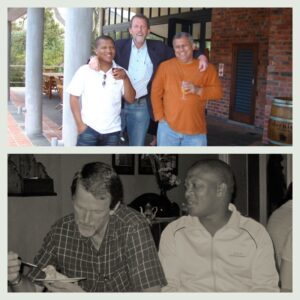 Pumlani was one of the quieter members of management, but when he spoke up one needed to listen very, very carefully in order to pick up all the hidden messages he wanted to convey.
Pumlani was one of the quieter members of management, but when he spoke up one needed to listen very, very carefully in order to pick up all the hidden messages he wanted to convey.
Bra Pum was a multidimensional figure in our centre and he had some hidden talents and roles of which many staff members were unaware: poet, acknowledged praise singer or imbongi, singer with a lovely voice, and, last but not least, someone with a sense of quiet humour that could tickle even my little toe. And he loved food. I will never forget a moment when we were planning for one of our Language Centre functions, and he stressed that there should be enough to eat, and “genoeg vléís, asseblief”. And I can still hear him saying “Oh, Gaaawwwd” (his pronunciation for this one was rather special!) when something went wrong.
I add two photographs of happy times I shared with a really special person, the first one taken at the staff function of 2006 and the second one when staff surprised me at home with my birthday in 2007.
I will never forget …
– Prof Leon de Stadler, former Director of the Language Centre
Short messages of condolence
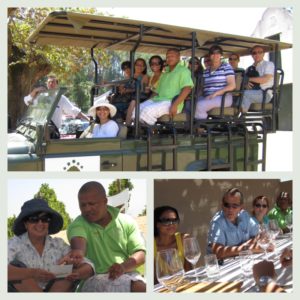
My deepest condolences on the passing of Pumlani. May you find comfort in knowing that he is at peace. Thinking of you and all my colleagues at the LC.
– Audrey Poole, former Language Centre colleague
***
Gosh, I am so shocked and sad to hear of Pumlani’s passing… Please let me know if there is anything I can assist with.
– Dr Antoinette van der Merwe, Senior Director of the Division for Learning and Teaching Enhancement
***
We at the Centre for Health Professions Education (CHPE) would like to extend our sincere condolences with you at the Language Centre. We are saddened with the death of your colleague and friend Pumlani. He has worked closely with the language facilitators at our faculty as well and we will really miss him.
All of the best for you all in this difficult time.
– Dr Elize Archer on behalf of the CHPE, Faculty of Medicine and Health Sciences
***
We have heard with great sadness of the passing of Pumlani Sibula. As the Global Education Centre (GEC), we would just like to share our condolences and share a message of support.
Pumlani has played such important role in terms of welcoming and teaching our international students. He will be dearly missed and remembered for his work.
Please let us know how we can be of support in this difficult time.
– Sarah Jane van der Westhuizen, Global Education Centre
***
My sincere condolences on the passing of Pumlani. What an absolute shock this was to hear. May we always remember how passionate he was about educating the students.
– Kristin Rutgers, Human Resources
***
This is indeed sad and shocking news. I will miss his friendly smile and positive outlook on life. He was a fun person to be around and I will always remember the “after party” we had after a year-end function when I invited him to stay over and we enjoyed a late-night chat and early morning breakfast before work. I attended two of his isiXhosa courses that he presented professionally and also in a fun and entertaining manner.
RIP Pumlani, you will be missed!
– Lize Kruger, Language Centre colleague
***
As Faculty of Theology we would like to express our deepest condolences with the passing away of Pumlani. He worked so valiantly to teach a large group of us basic isiXhosa. We just loved his humour, and appreciated his patience and particularly his sheer joy in sharing with us something of the beauty of this language. He was a very special person, and his loss is also the loss of our wider community. We share your grief, and wish you comfort and strength for the road ahead.
– Marieke Brand, Dean’s Office, Faculty of Theology
A passion for teaching isiXhosa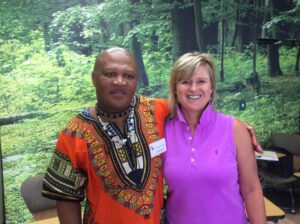
My dear Pumlani
I am overwhelmed by your sudden departure, gxa wam. Intliziyo yam ibuhlungu. What a privilege it has been to be part of your flamboyant life space. You were a sincere, kind-hearted, reliable, hard-working colleague with an unwavering commitment to excellence. But also one with undeniably good taste. I adored your exquisite interpretation of African fashion and your infatuation with elegant shoes. I was also inspired by your passion for teaching novices the basics of isiXhosa so consistently and logically while everyone was having fun. Those animated songs and your excitement at demonstrating them, still warm my heart after all these years. As a terminologist, you were always prepared to search for isiXhosa translations for our trilingual glossaries, even if it meant using five words to translate one term. Your glossaries are your intellectual contribution to the service of higher education and society at large, Pumlani. I shall always cherish your professional legacy and quality of friendship.
Until we meet again.
Ngomkhulu umbuliso.
– Dr Anita Jonker, Faculty of Arts and Social Sciences colleague
Video: 30 seconds of Pumlani teaching isiXhosa
Eulogy for a dear friend and colleague: Pumlani “Sihlobo sam” Sibula
An institutional language specialist, a dedicated colleague and loyal friend, whom I had the unique privilege of being closely associated with, for the past eight years, both at an interdepartmental level and more recently, at the Language Centre office we fondly shared.
Pumlani was a compassionate, empathetic and humble public servant, who cared about what matters most in life, the people he worked with and those he selflessly served. A dedicated, sensible, polite and friendliest man, who called everybody “Sihlobo sam – my friend!”.
There is an old adage that says: “Dressing well is a form of good manners.” This gentleman was indeed a very smart dresser, exuding good manners on a daily basis, through his exquisite style of dress and his indulgent smile, within his place of work and everywhere he is.
He left nothing in the tank. He was a man who led a life where the means were as important as the end. The example he set made you want to be a better colleague, a better sister, a better friend and to be better at your job.
He left behind an illustrious career where he worked efficiently in Makupula High School and at the Stellenbosch University, assisting students with good language skills. He worked in the Language Centre, developing terminology and multilingual glossaries, to help lecturers and students achieve a better understanding of the subject content. He also contributed to the naming of various buildings, departments and faculties of Stellenbosch University into isiXhosa, alongside English and Afrikaans names.
He was a developer and a pioneer of isiXhosa literary works across the language divide in the Western Cape. His language developmental network stretched from different faculties in our university, to community language clubs around Stellenbosch, to international universities, Pansalb, the Western Cape Education Department, National Language Services, Project for the Study of Alternative Education in South Africa (PRAESA), the Writers Guild… the list is endless. In just one year of working with him in the Language Centre, Pumlani personally taught me how to help students from a non-English background to understand any subject content better, through developing key course glossaries or terminology for the benefit of students, whilst also sharing his unprecedented expertise in the special isiXhosa course we offered to non-mother tongue students across the University.
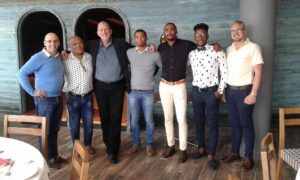 I recall everyone who comes to our office – his former students, former colleagues and line managers – praising him for his charisma and immeasurable kindness. Below are examples of sentiments shared with me by those who knew him:
I recall everyone who comes to our office – his former students, former colleagues and line managers – praising him for his charisma and immeasurable kindness. Below are examples of sentiments shared with me by those who knew him:
Dr Vuyo Mntuyedwa: “Ndikule ndawo ndikuyo nje ngubhuti Pumlani. Ndifundisa eyunivesithi namhlanje, kwaye kungenxa yokuqeqeshwa nguye.”
Dr Xolani Mavela: “Umzi wesiXhosa ngokubanzi ulahlekelwe. UPumlani sisithwalandwe, isikhuthali, ithandazwe, ithandamntu novulindlela kuphuhliso lwesiXhosa jikelele.”
Ms Nosisa Beyile (Curriculum Advisor): “Andikholelwa ukuba uMhegebe usishiyile. Kazi sakuncedwa ngubani na ekuhleleni iinkqubo zoncwadi lwesiXhosa siyiWCED?”
Abafundi baseKayamandi: “Ukuba sasingalifumenanga ithuba lokufundiswa ngutitshala uSibula, ngesingekho kwezi ndawo sikuzo namhlanje.”
Isn’t that finally the measure of a man: the way he lives, how he treats others, no matter what adversities in life he may be faced with? Pumlani was a great man and he reminds me of Anastasia Netri’s definition of a man when she says: “A good man will want you to shine. He wants you to be your amazing self.” And that’s how we all remember “Sihlobo sam”, because with his enthusiasm, his smile and his undivided support, he wanted everyone to reach for the stars.
May your soul rest in peace “Sihlobo sam”, and rise up in glory. Hamba kakuhle ulale ngoxolo Mpondo, Mgebe, Mngxongo!
Your friend and sister
– Dr Zandile Kondowe, Language Centre colleague
Pumlani did his work with love
I met Pumlani at the University of Transkei, now known as Walter Sisulu University in the early 1990s. He was a student in the Department of African languages. From the onset, he struck me as a hard working student who demonstrated his love for isiXhosa by writing pieces of poetry and traditional songs, and he would occasionally ask me to read his draft manuscripts. When I left Mthatha, and took employment at Unisa in 1993, I continued to be his mentor.
When he joined Stellenbosch University, and became involved in the development of subject- specific terminology lists for Psychology, Sociology and other disciplines, he always asked me to assist with the final quality check of isiXhosa terms and definitions. He saw potential in isiXhosa and believed that, given an opportunity, it could become a language of teaching and learning and research in higher education. As Unisa implemented its 2010 Language Policy in 2011, Pumlani became my consultant. He took me through the SU Language Centre process of terminology development starting from the selection of terms, the role of subject specialists, term formation strategies as well as quality assurance measures. As the Unisa Language Unit, we were planning to collaborate on projects that promote the use and development of African languages in general and isiXhosa in particular.
Pumlani did his work with love. As Gibran says;
And when you work with love, you bind yourself to yourself and to one another and to God
You weave the cloth with threads drawn from your heart, even as if your beloved were to wear that cloth
You build a house with affection, even as if your beloved were to dwell in that house
You sow seeds with tenderness and reap the harvest with joy, even as if your beloved were to eat the fruit.
You charge all things you fashion with a breath of your own spirit.
That is what Pumlani did. He worked hard developing isiXhosa, and by doing so, fulfilled a part of earth’s dream that was assigned to him when the dream was born. When we look down in our hearts, we are sad that he is gone, but the same hearts are filled with joy, as we will continue to reap the harvest of his hard labour.
– Prof Koliswa Moropa, Unisa Language Unit
Cleanliness is next to godliness
Elingahlalwa mpukane lona ihomba! So neat and tidy was he, reflecting the saying, ‘Cleanliness is next to godliness’. I remember his neat, well-planned assignments as both his teacher at Buntingville High School (Mthatha) and his lecturer Unisa.
He loved his work with passion. He took pride in every task he was presented with, be it teaching, translation, editing or development and coining of Xhosa terms.
In retirement and with my mental faculties not functioning at today’s pace, I had turned Pumlani to be my unpaid advisor and guide in my post-retirement language-related tasks. He provided his assistance without complaint and with such patience I find hard to compare. His undying smile and enthusiasm for isiXhosa language would break through the written messages he shared, be it on WhatsApp, telephonic or e-mail.
UPumlani ubenesiphiwo sokuthanda nokuhlonipha abantu asebenzisana nabo. Liyinyani elithi Isitya esihle asidleli. Wanga Umphefumlo wakhe Ungaphumla Ngoxolo.
– Dr Thabazi Ntshinga, Unisa retiree, Department of African Languages
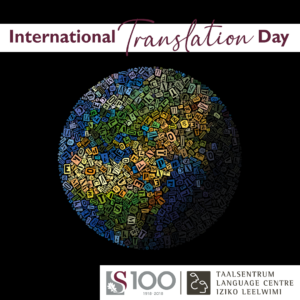
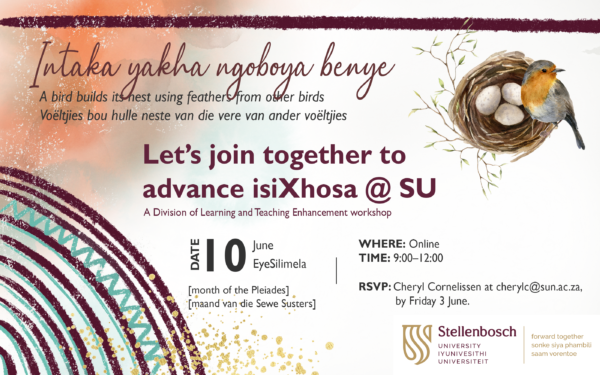
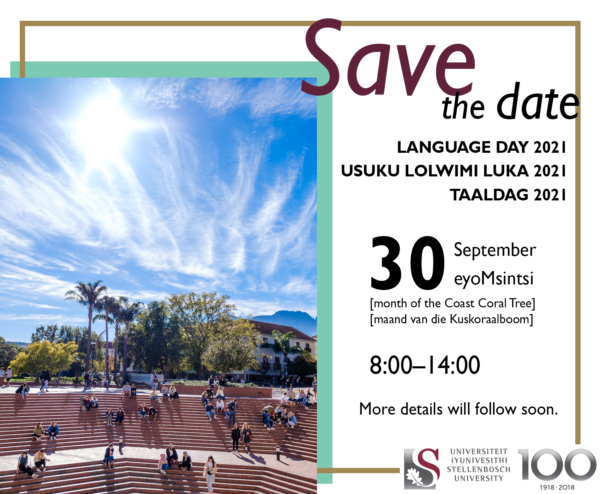
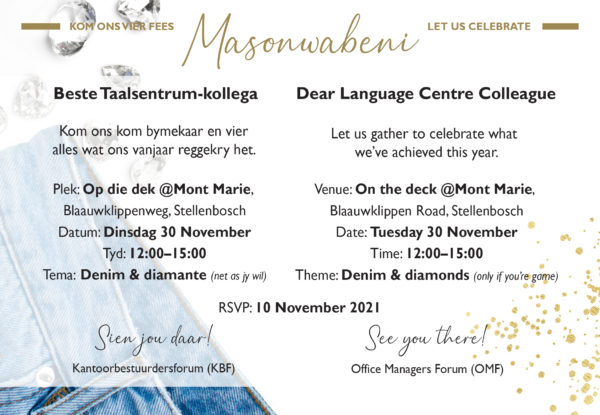
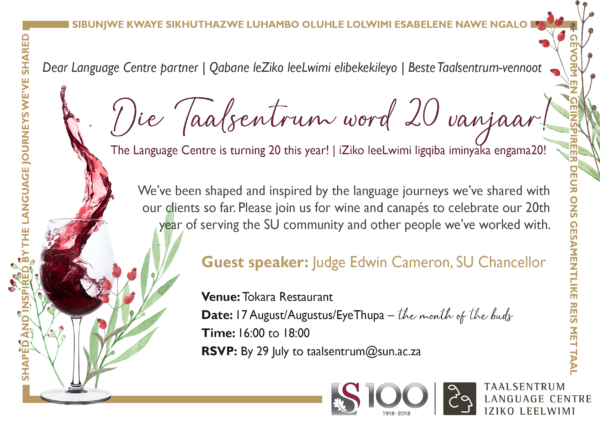
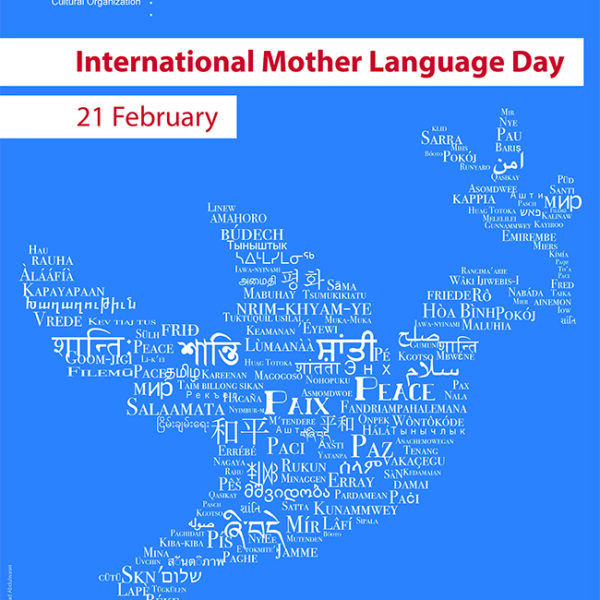
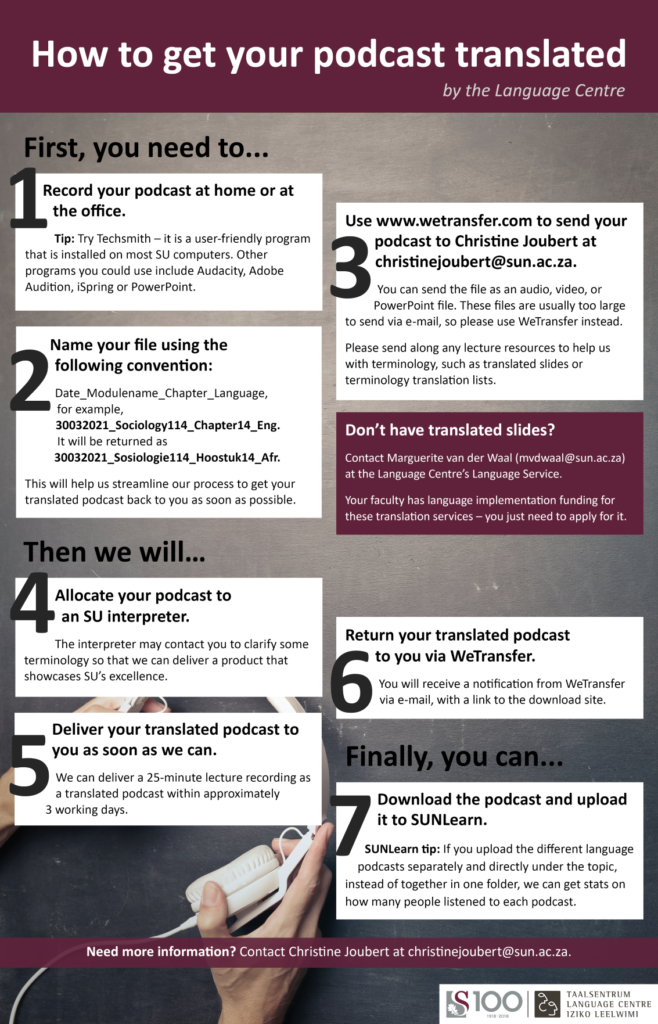

 Friend and supporter
Friend and supporter Pumlani was one of the quieter members of management, but when he spoke up one needed to listen very, very carefully in order to pick up all the hidden messages he wanted to convey.
Pumlani was one of the quieter members of management, but when he spoke up one needed to listen very, very carefully in order to pick up all the hidden messages he wanted to convey.

 I recall everyone who comes to our office – his former students, former colleagues and line managers – praising him for his charisma and immeasurable kindness. Below are examples of sentiments shared with me by those who knew him:
I recall everyone who comes to our office – his former students, former colleagues and line managers – praising him for his charisma and immeasurable kindness. Below are examples of sentiments shared with me by those who knew him: The Language Centre is a vibrant hub for students, staff and clients who require language and communication assistance.
The Language Centre is a vibrant hub for students, staff and clients who require language and communication assistance.